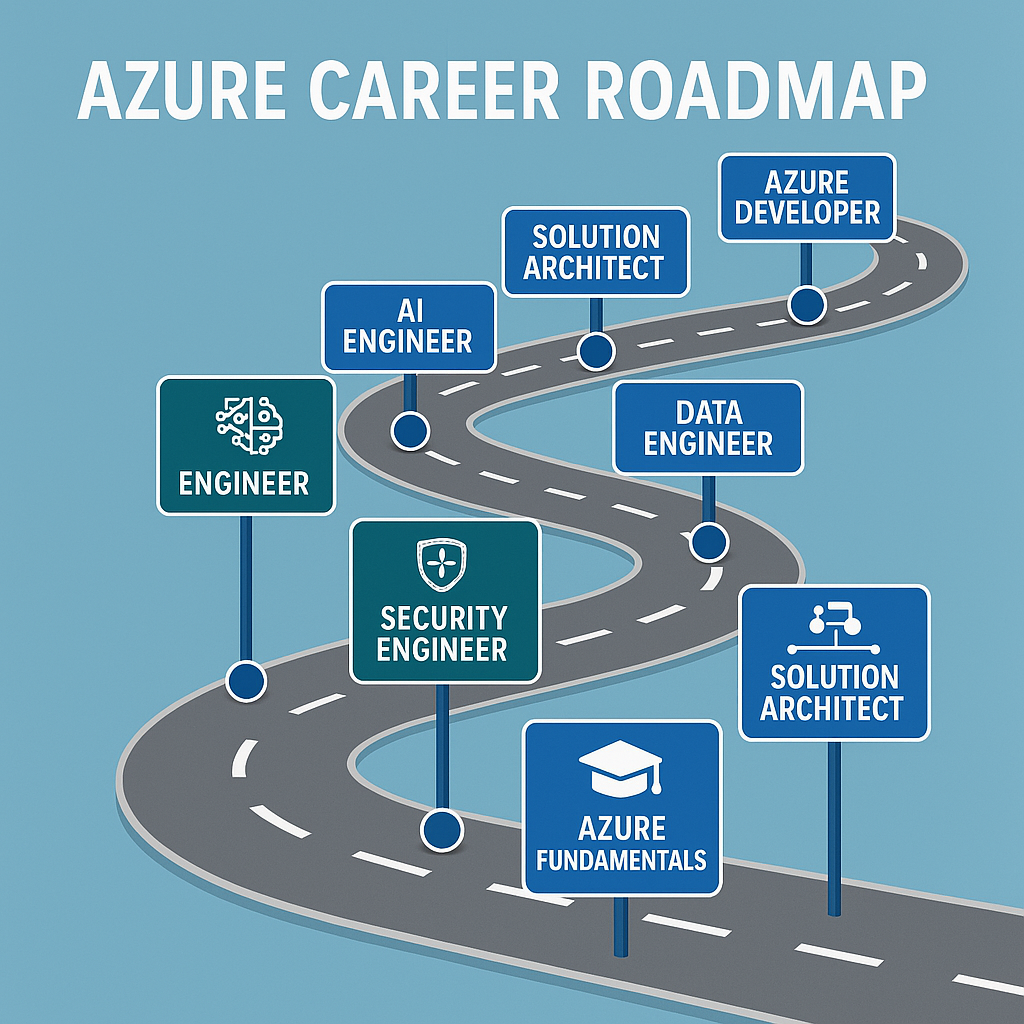
The world of cloud computing is evolving at breakneck speed, and one platform that continues to lead this evolution is Microsoft Azure. For anyone considering a thriving career in the cloud domain, the Azure Career Roadmap: Beginner to Expert is a powerful guide that outlines the ideal learning path, skill development stages, and growth opportunities.
Before diving deep, if you’re wondering where to begin or how much it might cost, check out this detailed azure certification path for role-based tracks and azure certification cost to plan your investment.
Whether you’re an absolute beginner or a seasoned IT professional, understanding the Azure Career Roadmap: Beginner to Expert can be the foundation of a fulfilling cloud journey.
Why Choose Azure for Your Cloud Career?
With over 95% of Fortune 500 companies using Azure, it’s no surprise that career opportunities on this platform are exploding. Microsoft’s robust infrastructure, enterprise partnerships, and wide range of cloud services make Azure a goldmine for IT professionals in fields such as development, AI, data science, DevOps, and security.
Understanding the Azure Ecosystem
Before we jump into the Azure Career Roadmap: Beginner to Expert, it’s essential to understand what the Azure ecosystem entails:
- Over 200 cloud products and services
- Integrations with Microsoft tools like Office 365, Dynamics, and Power BI
- Support for Linux, Windows, and open-source tools
- Global availability in 60+ regions
This versatility means professionals from various backgrounds can carve a niche in Azure.
Azure Career Roadmap: Beginner to Expert – The Complete Journey
Let’s break down the Azure Career Roadmap: Beginner to Expert into clear, actionable stages:
Stage 1: Getting Started – Beginner Level
The first step is building your foundation. At this stage, focus on understanding what Azure is and how it works.
1. Learn Azure Fundamentals
Start with the AZ-900: Microsoft Azure Fundamentals certification. It’s designed for beginners and doesn’t require prior cloud experience.
Skills you gain:
- Cloud concepts (IaaS, PaaS, SaaS)
- Core Azure services (VMs, storage, networking)
- Azure pricing and SLA
- Security and compliance basics
2. Explore Azure Portal Hands-On
Create a free Azure account and start navigating the portal. Play around with basic services like:
- Azure Storage
- Virtual Machines
- Web Apps
- Azure Monitor
Stage 2: Specialization – Intermediate Level
After learning the basics, the next part of the Azure Career Roadmap: Beginner to Expert involves choosing a specialization.
1. Choose a Role-Based Certification
Microsoft offers role-based certifications aligned with industry demands. Here are some popular tracks:
| Role | Certification | Code |
| Administrator | Azure Administrator Associate | AZ-104 |
| Developer | Azure Developer Associate | AZ-204 |
| Security | Azure Security Engineer Associate | AZ-500 |
| DevOps | Azure DevOps Engineer Expert | AZ-400 |
| Data Engineer | Azure Data Engineer Associate | DP-203 |
| AI Engineer | Azure AI Engineer Associate | AI-102 |
These certifications prepare you for specific job roles and make your profile highly employable.
2. Focus on Real Projects
Nothing beats real-world experience. Try:
- Deploying an application using Azure App Service
- Setting up CI/CD using Azure DevOps
- Creating a virtual network and subnet
Hands-on skills help solidify what you’ve learned and make your resume stand out.
Stage 3: Becoming an Expert – Advanced Level
This stage of the Azure Career Roadmap: Beginner to Expert is where you gain mastery and leadership capabilities in cloud computing.
1. Target Expert-Level Certifications
If you already hold an associate-level certification, go for expert credentials such as:
- Microsoft Certified: Azure Solutions Architect Expert (AZ-305)
- Microsoft Certified: DevOps Engineer Expert (AZ-400)
These are ideal for professionals looking to take up architectural or strategic roles in organizations.
2. Build Domain-Specific Expertise
By now, you should have explored different services. Choose an area to dive deep into:
- AI & Machine Learning with services like Azure Cognitive Services and Azure Machine Learning
- Data & Analytics with Azure Synapse and Databricks
- Security & Compliance with Azure Defender and Sentinel
Domain-specific knowledge differentiates you from generalists and opens up niche opportunities.
Stage 4: Professional Excellence & Industry Recognition
Here’s where you become a thought leader or architect in the Azure world.
1. Contribute to Open Source & Tech Communities
- Contribute to Azure GitHub repositories
- Share knowledge via LinkedIn or YouTube
- Speak at meetups or webinars
2. Gain Soft Skills and Business Acumen
To lead cloud initiatives, technical skills alone won’t suffice. Learn:
- Cloud economics and cost optimization
- Agile and DevOps methodologies
- Stakeholder communication
Midway Recap: Your Strategic Progression
By the time you’re halfway through the Azure Career Roadmap: Beginner to Expert, you’ve not only passed certifications but also accumulated real-world experience and role-specific expertise.
This balanced growth—across hands-on practice, role mastery, and soft skills—makes you stand out in the job market and helps you grow into solution architect roles or even CTO positions over time.
Top Tools and Technologies to Learn Along the Way
While on the Azure path, mastering the right tools enhances your capabilities:
| Area | Tools/Services |
| DevOps | Azure DevOps, GitHub Actions |
| AI | Azure ML, Cognitive Services |
| Infrastructure | ARM Templates, Bicep, Terraform |
| Data | Azure SQL, Cosmos DB, Data Factory |
| Monitoring | Azure Monitor, Log Analytics |
What Industries Are Hiring Azure Professionals?
Industries embracing Azure include:
- Finance – for secure and compliant environments
- Healthcare – for handling patient data
- Retail – for predictive analytics and smart operations
- Manufacturing – for IoT solutions and real-time monitoring
- Government – for high-security cloud solutions
Each of these sectors is on the lookout for cloud professionals who can align technology with business goals.
Tips to Accelerate Your Azure Career Growth
- Stay Certified, Stay Updated – Microsoft updates certifications frequently. Stay current.
- Work on GitHub Projects – Open-source exposure gives you credibility.
- Network with Azure Professionals – LinkedIn and Azure Meetups are great for this.
- Experiment Continuously – Keep playing in your Azure sandbox.
- Practice for Interviews – Hands-on labs, mock interviews, and real case studies help you ace cloud roles.
Final Thoughts: Crafting Your Azure Success Story
The Azure Career Roadmap: Beginner to Expert isn’t just a learning path—it’s a strategic blueprint to elevate your IT career in the cloud age. With a structured approach, dedication to upskilling, and a passion for hands-on learning, you can transform from a novice into an Azure expert who leads impactful cloud initiatives.
Whether you’re starting from scratch or pivoting from a different tech role, Azure opens up endless doors in architecture, AI, DevOps, and more. Stay focused, stay curious, and let the cloud elevate your career!
FAQs About Building a Career in Microsoft Azure
How long does it take to become proficient in Azure?
Typically, 6–12 months of consistent learning and practice can help you become proficient in core Azure services and earn at least one associate-level certification.
Which Azure certification should I start with?
Start with AZ-900: Microsoft Azure Fundamentals if you’re new. From there, pick a certification based on your career goals—developer, admin, data engineer, etc.
Can a non-technical person start a career in Azure?
Yes! AZ-900 is beginner-friendly. From there, with commitment, even non-tech professionals can transition into technical roles via role-based learning.
Do Azure certifications expire?
Yes. Most Azure certifications are valid for one year but can be renewed for free by taking a short online assessment.
Is coding mandatory for learning Azure?
Not necessarily. Admin or security roles require minimal coding. However, development, DevOps, and AI roles benefit from knowing languages like Python or C#.
What jobs can I get after completing Azure certifications?
You can apply for roles like Cloud Administrator, Azure Developer, DevOps Engineer, Data Engineer, and Security Analyst, depending on your path.
Are Azure roles in demand globally?
Absolutely! Azure has a strong market share in the US, Europe, India, and Australia. Cloud-related roles, especially Azure ones, are among the top in demand.
What skills besides Azure should I learn?
Complementary skills include DevOps practices, scripting (PowerShell, Bash), networking, databases, security, and soft skills like communication and documentation.
Can I freelance with Azure skills?
Yes. Many startups and small businesses need Azure consultants for short-term projects like app deployment, automation, or migration.
What is the average salary of Azure professionals?
Azure salaries vary based on region and role. For example, an Azure Solutions Architect can earn $120K+ in the US and ₹20 LPA+ in India.


